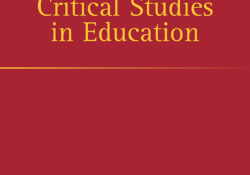tandfonline.com har udgivet en rapport under søgningen “Teacher Education Mathematics”: Abstract Abstract This paper explores relationships between environment and education after the Covid-19 pandemic through the lens of philosophy of education in a new key developed by Michael Peters and the Philosophy of Education Society of Australasia (PESA). The paper is collectively written by 15 authors who responded to the question: Who remembers Greta Thunberg? Their answers are classified into four main themes and corresponding sections. The first section, ‘As we bake the earth, let’s try and bake it from scratch’, gathers wider philosophical considerations about the intersection between environment, education, and the pandemic. The second section, ‘Bump in the road or a catalyst for structural change?’, looks more closely into issues pertaining to education. The third section, ‘If you… Continue Reading →
Like this:
Like Loading...
tandfonline.com har udgivet en rapport under søgningen “Teacher Education Mathematics”: Abstract Abstract In this paper, I will explore the experience of noticing/becoming attentive to something in education. What does it mean to take notice of something in an educational way, and how does something become educationally noteworthy? In order to grasp in more detail the idea of something being noteworthy, I turn to the metaphor of pearl diving – as this appears in the works of Hannah Arendt and Walter Benjamin – and to Martin Wagenschein’s theory of exemplarity. These perspectives helps us to grasp not only the centrality of exemplarism in education. It also helps us to grasp what makes something educationally noteworthy, and how this is connected to attention and formative experiences. From this, we can return to… Continue Reading →
Like this:
Like Loading...
tandfonline.com har udgivet en rapport under søgningen “Teacher Education Mathematics”: ABSTRACT ABSTRACT This paper explores the role of exemplarity in education through a conceptualisation of two different dimensions of exemplarity in educational practice. (1) Pedagogical exemplarity, which relates to the pedagogical and ethical dimension of educational practice. In other words, this dimension explores the educational moments when someone takes up an exemplary function in educational practice. (2) Didactical exemplarity, which relates to the exemplary function of subject matter or educational content. In other words, this dimension explores the educational moments when something takes up an exemplary function in educational practice. Through an initial conceptual exploration of these two dimensions, via the works of Linda Zagzebski and Martin Wagenschein, the paper sets out to lay the foundation for a deeper understanding… Continue Reading →
Like this:
Like Loading...
tandfonline.com har udgivet en rapport under søgningen “Teacher Education Mathematics”: ABSTRACT ABSTRACT Psychiatric/neurodevelopmental diagnoses have expanded in number and scale with increased influence over matters of education and upbringing. One of the most common psychiatric diagnoses among children and adolescents is attention deficit hyperactivity disorder (ADHD). The dominant perspective of ADHD is biomedical, where ADHD is defined as a neurogenetic dysfunction and disorder of the brain. Due to the absence of biological markers, the diagnosis is legitimized on the basis of a humanitarian principle: as an ideology. Through the diagnosis, which is construed in the article as a form of onto-epistemological violence, the unique subject is forced into an object and a second-class citizen who undergoes instrumental techniques of behaviour modification. The overall leitmotif of the article is to shift… Continue Reading →
Like this:
Like Loading...
tandfonline.com har udgivet en rapport under søgningen “Teacher Education Mathematics”: ABSTRACT ABSTRACT As an overview in connection with the 50th anniversary of the Journal of Curriculum Studies (JCS), this article begins with John Dewey’s notion that all educational actions carry philosophical implications. The tension between different education-research philosophies, between non-social and social education philosophies in Dewey’s terms, becomes visible in an overview of articles published during the past 50 years of the JCS. Therefore, the purpose here is to explore in what different forms and in what different spaces the political takes shape in curriculum research. Policies on education always address fundamental political questions in the sense that debates on education inevitably include alternative views of good education and good society. Instead of looking for the political, it seems to be… Continue Reading →
Like this:
Like Loading...




